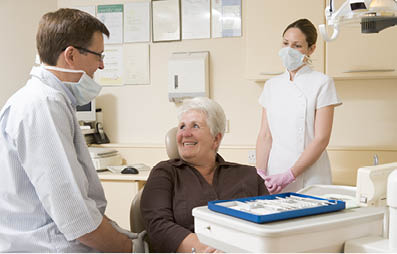Like car maintenance, as you clock up kilometres and years, your need for more regular services ― health checks and prevention screenings ― could add valuable years of well-being to the rest of your life. Early detection could save your life.
While we hope this article will help motivate you to schedule important health checks in, we’re only scraping the surface. Seek the advice of your General Practitioner or medical specialist, armed with some knowledge.
Please note, the recommendations provided in this blog article are current as of mid-September 2015.
Over 50s: your regular routine health check routine
Taking steps to ensure early detection of health concerns, will give you the best prognosis. Here are some of the key health prevention appointments you should be booking in, if you haven’t already.
Blood pressure
Once you’re over 40, you should have your blood pressure tested at least annually.
Blood pressure outside of the acceptable range can be a symptom of, or a cause of, serious health issues.
Blood tests
If you are at high risk of coronary heart disease due to family history, or your lifestyle, you should be booking in for a blood test and heart health check annually. If your General Practitioner (GP) has deemed you as low risk, once every five years is recommended.
Blood tests can reveal numerous health indicators. Cholesterol levels and blood triglycerides can be key indicators of heart disease, or being at risk of heart disease and are often the key focus of blood test results.
Bone density tests
If you are over 50, you need to book in for a bone density test. How often you need to schedule future screening will be determined by your initial test results.
Bone density tests determine the health and strength of your bones. The test results can provide an indication of your risk of bone fractures, or whether there are any other symptoms, such as osteoporosis, that require further investigation or preventative measures.
Visit osteoporosis.org.au to find out more.
Bowel cancer: the faecal occult blood test (FOBT)
If you are over 50, and low risk for bowel cancer ― there is no family history of bowel cancer or bowel health concerns ― a FOBT is recommended once every two years.
The Cancer Council Victoria’s website states, “thanks to the National Bowel Screening Program, currently people turning 50 will receive a free FOBT in the mail, every 5 years until they are 74.”
If you are deemed high risk, due to family history or your own health concerns or lifestyle, an FOBT is recommended once a year.
The FOBT identifies any early signs of bowel cancer that may need investigation. As with most health concerns, early identification usually has a better prognosis.
Your medical specialist will advise you how frequently you will need to book in for preventative screening via a colonoscopy or sigmoidoscopy.
Visit bowelcanceraustralia.org to find out more.
Breast examination and screening mammogram
Any woman over the age of 20 should regularly check their breasts and the surrounding area through self-examination. Yes, men have breast tissue too, but the incidence of male breast cancer in Australia ― according to breastcancer.org.au ― accounts for less than one percent of all breast cancer diagnosed.
If you are over 50, younger than 74, and at low risk of breast cancer ― there is no family history of breast cancer ― a screening mammogram is recommended once every two years .
If you are deemed high risk, due to family history, your own medical history or lifestyle, a screening mammogram is recommended annually.
Breast cancer is the most common cancer affecting Australian women. The risk increases with age with the majority of women diagnosed between 50 and 69 years. Early identification is critical for a better prognosis.
Visit bcna.org.au to find out more.
Dental care
Clean your teeth thoroughly, and as regularly as recommended by your dental specialist ―usually at least twice a day. Floss once a day, or as recommended.
Unless otherwise recommended by your dental specialist, book in for a dental examination and professional clean annually.
Replace your toothbrush every three to four months. If the bristles are looking askew, replace your toothbrush immediately.
Gum disease left unchecked can lead to all sorts of nasty health issues. Cleaning your teeth as recommended by your dental specialist will help prevent tooth decay, tooth loss and gum disease. Dental prevention strategies are necessary to minimise expensive, complicated dental procedures.
Diabetes: Type 2 and prediabetes
If you are over 45, you should be screened for diabetes either annually, or once every three years depending on your risk factors. Your level of risk will be assessed by your medical practitioner based on your current physical health and lifestyle, your weight, blood pressure, cholesterol levels and family history.
If not controlled effectively, diabetes will progressively cause damage to your body such as eye complications, impotence, organ complications, cardiovascular issues and gum disease.
Visit diabetesvic.org.au to find out more.
Eye testing
If you already wear prescription glasses or lenses, you should book in to an eye specialist ― an optometrist or ophthalmologist ― for testing once a year. If you’re under 60 and haven’t been diagnosed with eye diseases or specific risk factors, eye examinations are recommended once every two years.
Our vision deteriorates as we age, as does our risk of eye diseases. If you’re over 60, an annual exam is recommended regardless. The risk of developing eye diseases, such as macular degeneration, cataracts and glaucoma increases with age.
If you, or your family have a history of eye disease, high blood pressure, diabetes or are on prescribed medications with possible side effects impacting vision, ask your eye specialist how often you should be examined.
Visit visionaustralia.org to find out more.
Flu vaccination
If you are over 65, an annual flu vaccination is highly recommended.
Strains of influenza virus change each flu season, and seasonal influenza can be fatal to infants, older people or people already in poor health.
Visit immunise.health.gov.au to find out more about immunisations in Australia.
Hearing assessments
If you are experiencing any loss of hearing, or loved ones are consistently pointing out that your hearing is deteriorating, it is time to book in for a hearing test.
From 65 years of age onwards, the risk of experiencing disabling hearing loss increases, with the risk compounding after our mid-70s.
Prostate cancer screening: for men
The Prostate Cancer Foundation of Australia (PCFA) recommends that men over the age of 40 with a family history of prostate cancer, should book in for an annual Digital Rectal Examination (DRE) and Prostate Specific Antigen (PSA) blood test.
Prostate cancer is a slow growing disease where abnormal cells develop in the prostate, and can spread to other parts of the body. According to the PCFA, prostate cancer is the most commonly diagnosed cancer in men, with more men dying of this cancer in Australia, than women die of breast cancer.
Visit prostate.org.au for more information.
Pap tests and pelvic examinations: for women
If you are a woman over 18, you should book in for a Pap test and pelvic examination every two years until you’re 70 or your doctor advises otherwise.
The purpose of these preventative screenings is to pick up signs of irregularities that could develop into cervical cancer, or other signs of illness. The risk of developing cervical cancer is highest for the 85 years and over age group, followed by the 75 to 79 year age group.
Visit canceraustralia.gov.au for more information.
Skin checks
Regardless of your age, if you are regularly outdoors and exposed to sunlight in Australia, a skin check should be part of your annual health check.
Any irregular moles or skin growths should be checked immediately.
Our sunburnt country, has the highest rate of skin cancer globally. Two out three Australians will be diagnosed with some type of skin cancer before their 70th birthday.
Visit cancervic.org.au for more information.
Weight, waist measurements and BMI
Your weight, waist measurement and Body Mass Index (BMI) are all indicators of your physical health and should be checked annually, as part of your once a year overall health check.
The greater your waist measurement – the greater the health impacts on your internal organs. These measurements can also provide your medical practitioner with identifiers of other health issues.
If you’re at high risk of any health concerns, regular screenings and consultation with your GP are critical.
In summary, your annual health check over the age of 50 should include all of the following at least once every two years. Book your health check today:
- For women, a:
- Blood test
- Blood pressure check
- Bone density test
- Dental examination and professional clean
- Diabetes screening
- Eye examination
- Faecal occult blood test (FOBT)
- Flu vaccination
- Mammogram
- Pap test and pelvic examination
- Skin check
- Weight, waist measurement and BMI check.
- For men, add:
- Digital Rectal Examination (DRE)
- Prostate Specific Antigen (PSA) blood test





